#American Publishing is Wild Man
Explore tagged Tumblr posts
Text
Another issue plaguing the industry is one of pervasive and malicious copying and replication. Jane Friedman, an author and expert in the publishing industry, said Aug. 7 that she encountered around half a dozen books being sold on Amazon under her name. She had never written these books. "Whoever’s doing this is obviously preying on writers who trust my name and think I’ve actually written these books. I have not. Most likely they’ve been generated by AI," she wrote. "With the flood of AI content now published at Amazon, how can anyone reasonably expect working authors to spend every week for the rest of their lives policing this?" Friedman filed a report with Amazon (AMZN) - Get Free Report, but the company closed the case because her name is not trademarked and she is not the copyright owner for these AI-generated books.
Wow, the absurdity of that last sentence.
PSA: "Shaxpir" AI writing software: AVOID!

The tl;dr: A guy is selling subscriptions to an AI-based software tool to "help you write better novels." And to train it, he's used tens of thousands of novels from authors you know, without those authors giving him permission.
...Sometimes things seem to blow up with unusual speed. This particular shit seems to have hit the fan yesterday, primarily on Twitter, when various authors discovered the guy's website, prosecraft.io. This site featured "clippings" of writing from the authors he'd stolen from... and the revelation that he had scraped their entire books, not just excerpts, to train his AI. ("2,470,720,986 words," his website bragged, "from 27,668 books, by 15,622 authors." The only authors who were off limits, apparently, were people using [or paying for] his software.) Though the guy hastily took prosecraft.io down when the online explosions began, if you take a look at this Google search you can see the covers of just some of the books the entire contents of which he exploited for AI training.
This usage goes well beyond the "fair use" defense that he belatedly (and ineffectively) attempted to employ on Twitter. It's straightforward copyright infringement, on a massive scale: good old-fashioned theft.
Gizmodo has a goodish breakdown of the broad situation here.
The only upside to this sorry situation is that, at the legal end of things, this guy is certainly about to get nuked from orbit… because all those authors’ full-text works will still be in the guts of the guy’s AI. (Among the authors he made the gross tactical error of stealing from: Stephen King, James Patterson, the Pratchett Estate, and Nora Roberts. This... is not going to go well for him.)
Leverage's John Rogers sums it up succinctly:
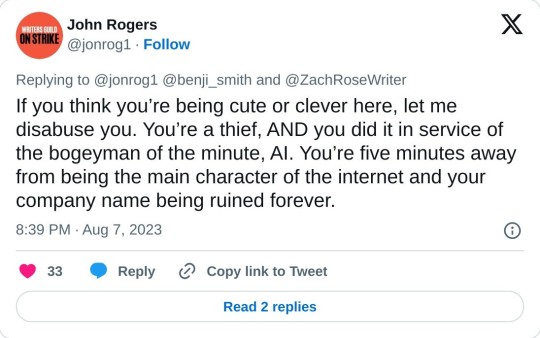
Meanwhile: the guy who created this whole mess is still selling subscriptions to his Shaxpir software (I'm not adding the URL here) that he trained using stolen goods. So—until someone stops him—you might like to reblog this info for the attention of others here who prefer their writing to stay human-made as well as -fueled, and not to support the seriously ethically-challenged.
And on a side issue: I'm idly wondering how long it'll take somebody to DMCA his still-live site's webhost or his domain registrar with an eye to taking down that down too. Granted, it'd be a temporary solution at best, until the big hitters' lawyers can get more permanent solutions in gear. But enjoyable...
4K notes
·
View notes
Note
would you have any reading suggestions to learn more about the earrings are evil era??? I've never heard of that aspect of fashion history and I am curious
Oh man, it was wild
you saw the first stirrings of it in the 1890s, when you started to get (mostly white and middle-to-upper-class) proto-feminists arguing that ear piercing was barbaric- keep an eye on the racist undertones there; they will come up again-and forcing women to suffer for fashion. I cannot emphasize enough that, until that point, ear piercing had been pretty much normal for this race/class/gender group. For centuries. You see criticism of the practice here and there, but nothing that really stuck.
The objections slowly increased until roughly the mid-1920s, when everything reached a tipping point and pierced ears became largely taboo for most white Americans and Brits of northern/western European descent. If that sounds HIGHLY specific, it is- communities from southern and sometimes eastern Europe retained cultural practices of ear piercing, to the point where it was often used as a point against them by mainstream society. It was also associated with Latino people, Black people, and the Romani, which. Yeah. I don't need to tell you how that went down.
It also developed associations with sexual immorality and/or backwards thinking. One newspaper letter I read came from a teen girl in the 1940s, wondering why she shouldn't pierce her ears if her very respectable grandmother had piercings. The response was something like "well, they did all sorts of things in the Bad Old Days that we shouldn't do now." True in many ways, or course, but...piercing your ears? That's the hill culture decided to die on as far as antiquated behavior that we should leave behind? Apparently yes.
Earrings themselves never went out of style, which led to the birth of clip-ons and screwbacks. Ironic that the "don't surfer for fashion" crowd was so eager to embrace screwing tiny vices onto your ears, but there we are. My own mother (born 1953) remembers her mother (born 1926) always taking off her screwback earrings immediately after getting home from a party, literally in the foyer of their house the second the door shut. There had been adaptations for unpierced ears before- Little Women, published in 1868, describes Meg March hanging earrings from a flesh-colored silk ribbon tied around the base of her ear -but they'd never caught on like this before.
However, the pendulum was soon to swing back. After just 40 years of Piercing Panic, in the 1960s, girls began piercing their ears again in droves. As piercing moved from the slumber party or summer camp back to the professional jewelers whose families had been early professional piercers in the 19th century- and to befuddled doctors who had no idea what they were doing yet still received piercing requests -cultural commentators had no idea what to make of it. Some decried the new trend while most took an air of bemused neutrality. My personal favorite article expressed surprise that "Space Age misses" were adopting these "Victorian traditions."
(In 1965, my grandmother took Mom to the anesthesiologist down the street who was offering to pierce his young daughter's friends gratis, and got it done. My grandfather had strongly disapproved of the idea, but in the end it took him a week to notice the new earrings.)
As to sources...honestly, I've just gone to Google Books, specified a time frame, and typed in "ear piercing," "pierced ears," "pierce ears," etc. Tons of primary sources at your fingertips, though I'm not always great about documenting or saving what I find. There's not much written about it formally, I've found- no books or scholarly studies. It may just be too close in history to attract much academic attention, though I find it fascinating.
This little blip where something that's been normal for most of western history suddenly became taboo for a hot second.
Also my ear piercings just turned 20 five days ago, commemorating the date that I was taken with much ceremony to Piercing Pagoda (and that horrible gun; it's a wonder I didn't get keloids) to get me out from underfoot while the Thanksgiving feast was being made. Grandma got hers pierced on the same day, at age 78. Happy Birthday, Marzi's ear piercings!
193 notes
·
View notes
Note
they killed fucking Stray!!! my favourite game!!!!! they killed it!!!! and outer wilds!!!!! what am i going to fucking do man!!!!
that's not really what happened
like it's fucked that negotiations went the way they did & basically the entire staff walked out (good on them for sticking up for themselves, hoping everyone that left can land on their feet in some way or another because they were doing some good fuckin work) & it sounds like some of the devs working with the publisher were kind of left in the dark for better or for worse (reminds me of the recent Humble thing where their whole publishing branch was let go recently... right on the verge of one of their games coming out. man)
but like... they're not the developers. they're the publishers. the games & the devs are still there. & i have to imagine the billionaires behind Annapurna (they don't just do video games! they've been multimedia for a whiiiiile now) would like to continue making More Money. so unless there's some contract weirdness / the devs want to pull out of their publishing contract somehow / the owners of Annapurna are very stupid I have to imagine they're not going to just vanish all of a sudden
mind you I am an artist & entertainer and not an expert on american business law or video game publishing so it's entirely possible im getting something wrong here. but this is my understanding at least
#''Just keep throwing money at upcoming critical darlings and make infinite money'' sounds like a pretty fuckin good investment#so it's sad & frustrating to see negotiations evidently go this sour between the staff & the people throwing the money#I do have to wonder what happened internally to get to this point. I wonder if we'll ever know...
153 notes
·
View notes
Text
Tbh when it comes to the claim that they've found the insurance ceo shooter I don't believe it for a few reasons. For one they reportedly found a 3d printed gun on the guy they caught and I kinda lol over that because are you joking? First off the gun the shooter used was 1000% not 3d printed and the idea that you would commit such a high profile murder and actively carry another gun, 3d printed or not, unrelated to said murder but highly related to the aim to commit an untraced murder is so bizarre that nah no way i don't believe someone would be that stupid after putting in this much effort. (how to i know for a fact the gun was not 3d printed btw? first of all look at it. second i know that 3d printed guns are TERRIBLE even at short range and can't fire three consecutive shots and if he designed one that could it would be a feat of engineering the rando they arrested is forsure not responsible for)
Second the manifesto, you can't be serious,,, his 'manifesto' was written on the bullets. This is not some unabomber shit, it's so extremely clean cut that the only person who can't seem to grock it accurately is ben fucking shapiro.
Third and listen maybe this is kinda just me being naive or hopeful but the idea that a guy with clear motive like this would be caught in a mcdonalds of all places is wild to me. Dude shoots an insurance ceo, flees a *single state* away and goes to eat at the #1 fast food chain in the world days after the crime when an international manhunt for him has been publicly announced. Either this guy is on track to get his picture published next to the definition for 'idiot savant' or the american police force has arrested a man who could vaguely be the perpetrator and planted evidence so they wouldn't have a cold case- the exact thing they might want to do for such a high profile case that has had exactly 0 solid leads since the shooting occurred and has had them very clearly fumbling. He's not guilty just because he's been arrested and anyone who's acting so certain that its definitely the guy is a rube in my book. I'm at least waiting for something that puts me far beyond a reasonable doubt
#spiced#luigi mangione#this used to be the site riddled with annoyingly long ace attorney posts debunking random shit and this is what gets everyone ffs#you can turn anyone into the perfect suspect if you treat everything as suspicious
72 notes
·
View notes
Text
man reading folks say LITBC is most likely~ and probably~ inspired by shows like Sex in the City & Friends is so wild to me and makes me wanna write something about like, other Korean media about relationships set in Seoul (which are like, so fucking many lmao like are we playing? are we acting out? are we being silly?) or otherwise about sex, love and life in a big city
idk why fandom always wants to connect things back to America like sure American media is fucking everywhere cause America is Like That (unfortunate) but idk man the author himself talked about what inspired LITBC and it wasn't some American tv shows three decades old
anyway if you dig LITBC I think it'd be worth reading Until I Meet My Husband both the BL manga (published by Penguin) and the original memoir (published by 7Seas). It's got similar vibes and is also about a gay man navigating his sexuality, coming out, life and relationships.
#love in the big city#litbc#chaos pikachu speaks#hmmmm am i gonna write an overly long essay about other shows/comics/etc with similar vibes?#idk i'm so lazy lol#i just can't with this idea that all non american media is somehow directly inspired by american media lmao#as if single in seoul didn't come out last year and stars one of sk's biggest actors#shit like this is gonna get me kicked lol#anyway I wonder how the film compares to the show
49 notes
·
View notes
Text
LGBT literature of the 1860s–1910s. Part 5
After a long pause, the list is back! Here we have a couple of plays, accounts by two trans women, lesbian poetry, and more.
1. Despised and Rejected, by A.T. Fitzroy (Rose Allatini; 1918). A pacifist novel published during World War One? With gay and lesbian characters? Yes, that was sure to get people in trouble. Its publisher was fined and the judge called it “morally unhealthy and most pernicious”. So, Dennis is a young composer who hates violence and therefore refuses to go to war. He also suffers because he is a “musical man”, that is, gay, and loves Alan, art-loving son of a wealthy businessman. His friend Antoinette, meanwhile, is “strangely attracted” to a woman. Nevertheless, the two attempt to love each other. When the war begins, Alan appears in Dennis’ life again, and they try to avoid being sent to the front together. Alan also persuades Dennis to accept who he is. Edward Carpenter himself defended the novel, saying that “the book is also a plea for toleration of a very much misunderstood section of humanity”. Read online
2. Autobiography of an Androgyne, by Ralph Werther (1918). Ralph Werther, also known as Jennie June, wrote this autobiography for doctors, and it is very revealing. Being a New York fairy (male prostitute) and possibly a trans woman, they tell frankly about the city’s gay underworld of the early 20th century and their personal experience, which is sometimes too frank and dark perhaps, but all the more interesting. Read online
3. Poems by Mikhail Kuzmin. Kuzmin was not just the author of Russia’s first gay novel, but also a poet. Many of his works were dedicated to or mentioned his lovers. I’d recommend Where Will I Find Words (in English and Russian), Night Was Done (both in English and Russian), from the 1906-1907 collection Love of This Summer (available fully in Russian), mostly based on his love affair with Pavel Maslov in 1906. And also If They Say (in English and Russian), which is a great statement.
4. The Loom of Youth, by Alec Waugh (1917). A semi-biographical novel based on Evelyn Waugh’s older brother’s experience at Sherborne School in Dorset. It is a story of Gordon Caruthers’ school years, from the age of 13 to 19, and it is full of different stories typical for public schools, be it pranks and cheating exams or dorm life and sports. Although the homosexual subject was quite understated, the author implied that it was a tradition and open secret in public schools. The book became popular and soon caused a great scandal. Worth noting that before that Alec was expelled for flirting with a boy. Read online
5. Two Speak Together, by Amy Lowell (1919). Lowell was a famous American poet and lesbian. Many of her poems were dedicated to her lover, actress Ada Dwyer Russell, specifically the section Two Speak Together from Pictures of the Floating World. These poems are infused with flower imagery, which wasn’t uncommon for lesbian poetry of the time. Read online
6. De berg van licht/The Mountain of Light, by Louis Couperus (1905-1906). Couperus is called the Dutch Oscar Wilde for a reason: this is one of the first decadent novels in Dutch literature. It is also a historical one, telling about a young androgynous Syrian priest Heliogabalus who then becomes a Roman Emperor. Homoerotism, hedonism, aestheticism: Couperus creates a very vivid world of Ancient Rome. He also covered the topic of androgyny in his novel Noodlot, which was mentioned in Part 3 of this list. Read online in Dutch
7. Frühlings Erwachen/Spring Awakening/The Awakening of Spring, by Frank Wedekind (1891, first performed in 1906). This play criticized the sexually oppressive culture prevalent in Europe at the time through a collection of monologues and short scenes about several troubled teens. Each one of them struggles with their puberty, which often leads to a tragic end. Like in The Loom of Youth, homosexuality is not the central focus of the play, but one character, Hänschen, is homosexual and explores his sexuality through Shakespear and paintings. The play was later turned into a famous musical. Read online in German or in English
8. Twixt Earth and Stars, by Radclyffe Hall (1906). Though it wasn’t known to many at the time, these poems were dedicated to women, some to Hall’s actual lovers. Read online
9. The Secret Confessions of a Parisian: The Countess, 1850-1871, by Arthur Berloget (published in 1895). This account is similar to the Autobiography of an Androgyne, albeit shorter. The author nowadays is thought to be a trans woman. They describe their love for women’s dresses, the euphoria from wearing dresses, makeup and wigs, the life as a “female impersonator” in Parisian cafe-concerts, and their love affair with a fellow prisoner. The autobiography is not available online, but you can read it in Queer Lives: Men’s Autobiographies from Nineteenth-Century France by William Peniston and Nancy Erber.
10. At Saint Judas’s, by Henry Blake Fuller (1896). This is possibly the first American play about homosexuality. It is very short. An excited groom is waiting for his wedding ceremony in the company of his gloomy best man. They are former lovers, and this short scene is not going to end well… Read online
Previous part is here
#lgbt literature#lgbt fiction#queer history#queer fiction#lesbian literature#russian literature#gay literature#gay history#spring awakening#lesbian history#blog: history#blog: literature
329 notes
·
View notes
Text
IWTV Season 2 Sources & References
Season 1 here (these lists are updated regularly)
Season 3 here
Cited by the Writer’s Room/Cast:
The Ethnic Avante-Garde: Minority Cultures and World Revolution by Steven S. Lee
Paris Journal 1944-1955 by Janet Flanner (Genet)
The Vampire: A Casebook by Alan Dundes
Anne Rice’s Vampire Chronicles: An Alphabettery
The Fly cited by Jacob Anderson
King Lear by Shakespeare cited by Rolin Jones
The Third Man (1949) cited by Levan Akin
An American in Paris by George Gershwin (1928) cited by Daniel Hart
Giovanni’s Room cited by Jacob Anderson
References:
Melmoth the Wanderer by Charles Maturin
Sebastien Melmoth by Oscar Wilde
Ode to a Nightingale by Keats
Amadeus (1984)
The Lost Boys (1987)
Gaslight (1944)
Batman
Casablanca (1942)
Now, Voyager (1942)
Moulin Rouge (2001)
The Phantom of the Opera
Les Vampires (1915)
Dracula (1931) credit to @vampchronicles_ on twt
Le Triomphe de L’amour by Pierre de Marivaux
Existentialism is a Humanism by Jean Paul Sartre
Les Liaisons Dangereuses by Pierre Choderlos de Laclos
Romeo and Juliet by William Shakespeare
How to Win Friends and Influence People by Dale Carnegie
Hamlet by William Shakespeare
Vampire’s Kiss (1988) credit to @talesfromthecrypts
Les Morts ont tous le Meme Peau by Boris Vian credit to @greedandenby
The Most Dangerous Game by Richard Connell
Waiting for Godot by Samuel Barclay Beckett credit to @rorscachisgay on twt
An Enemy of the People by Ibsen
Anna Karenina by Leo Tolstoy
Vie de Voltaire by Marquis Condorcet
Simone de Beauvoir: A Critical Introduction by Edward Fullbrook and Kate Fullbrook credit to @iwtvfanevents
Nightwood by Djuna Barnes credit to @iwtvfanevents
Beloved by Toni Morrison
Artists, Art, and Salons:
R-26
Palma Vecchio
Andre Fougeron
Elsa Triollet
Fred Stein
Lisette Model
Gordon Parks
Miguel Barcelo
Taxidermied Javelina by Chris Roberts-Antieau
Ai WeiWei (wallpaper)
David Hockney (Lemons)
Wols
The Kiss of Judas by Jakob Smits
Salome by Louis Icart
Ophelia by John Everett Millais
Shelter by Peter Macon
The Kiss by Edvard Munch
The Vampire or Love and Pain by Edvard Munch credit @iwtvasart
Ruiter on Horse by Reiger Stolk credit @ iwtvasart
Portrait of Frank Burty Haviland by Modigliani credit @iwtvasart
Self-Seers II (Death and Man) by Egon Schiele credit to @90sgreggaraki
The Sleep of Reason Produces Monsters by Goya
Aicha by Felix Vallotton
Cariatide by Modigliani
Nature Morte Au Pain Et Au Cocteau by Louis Marcoussis
Untitled by Julio Gonzalez
Embrace by Mikulas Galanda
Trees on a Mountain Slope by Ernst Kirchner
Landscape Paris by Henry Lyman Sayen
Tabac 56 by Oscar Garcia
Spirituals by Lillian Richter Reynolds
Movie & Play Posters on set (in chronological order by year):
Tarzan and his Mate (1934)
Avec le Sourire (1936)
Les Deux Gosses (1936)
Le Jour Se Leve (1939) about a man who commits murder as a result of a love triangle and locks himself in his apartment recounting the details as the police attempt to arrest him. Credit to @laisofhyccara
Nuit de Décembre (1940)
Mademoiselle Swing (1942) about a girl who follows a troupe of swing musicians to Paris.
Les Enfents du Paradis (1945) about a woman with many suitors including an actor and an aristocrat.
Fantomas (1946) about a sadistic criminal mastermind. This version includes a hideout in the catacombs where he traps people.
Quai des Orfevres (1947) watch here
Monsieur Vincent (1947)
Le Cafe du Cadran (1947) about a wife’s affair with a violinist.
La Kermesse Rouge (1947) film about a jealous artist who locks up his younger wife and a fire breaks out while she’s trapped.
Morts Sans Sepulture by Jean-Paul Sartre (play) also published in English translations as “The Victors” or “Men Without Shadows” about resistance fighters captured by Vichy soldiers struggling not to give up information.
Mon Faust by Paul Valery (play)
Musical Influences:: @greedandenby collected all music used in Season 2 here.
Henry Cowell
Meredith Monk
Howling’ Wolf
Shirley Temple
Jason Lindner Big Band
The Teeth
Carlos Salzedo
Alice Coltrane
Thelonius Monk
David Lang
Caroline Shaw
Gadfly by Shostakovich (for Raglan James)
musical career of Martha Argerich
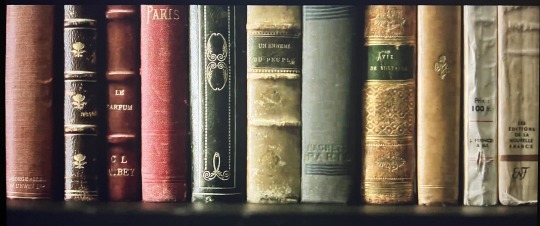
#iwtv#season 2#given that the posters are starting to come out of Prague I decided to start compiling sources and references in one place#Set design#production design#iwtv art
296 notes
·
View notes
Text
Spooktober 2024: Day 22 Home Invaders
Warning: Breaking and entering, implied kidnapping, military politics and terrorism, Reader is female and is implied to be a famous writer
I don't know how to feel about this one, y'all. I like the idea, but I'm not sure about the pacing...
You’re curled up on the sofa, the tv playing some mindless soap opera as you type away at your script. Your publisher is breathing down your neck for new work, especially when your most recent book is already slatted for a possible movie adaptation. You already nixed the adaptation, having seen the rewrites that basically butcher the script you were willing to allow. The story needs to remain as pure as it could, going from the beginning to the end. Instead, their rewrites had become meandering, obviously trying to add drama that adds nothing to the story. Disappointing, but not surprising with how Hollywood does its dirty business.
A rustling in your garden catches your attention. You pause and listen, confused about what could have made that noise. There’s no feral cats in the area and you unfortunately lost your dog a few months ago. There are no woods nearby, so it’s unlikely to be a wild animal. However, you don’t hear anything else. You turn back to your laptop and return to work, deciding it must just be the wind.
Suddenly, there’s a knock on your door, startling you again. Slowly, you rise from the couch and pad quietly to the door, peering around the corner to peek outside through the window. A man is standing there, handsome, but unfamiliar. You slowly walk toward the door, hesitant, especially when the man sees you. Angular, is the first thing you think, shuffling over to the door. He gives you a smile that sets you on edge. Your husband is still deployed and you had planned to get another dog with him, leaving you relatively defenseless. Then you see his eyes.
“Oh shit,” you gasp, scrambling to the cellar. You hear glass break, but you don’t pause. John had told you what to do if any of his enemies find you.
“Listen, Love. If any one you don’t know tries to get you while I’m not home, barricade in the cellar. I’ll leave down a charged phone, a charger, and a few guns. Use those guns if any of those fuckers make it down. Call me on that phone, then call Kate, then the police. In that order. If I can’t make it home in time, Kate will dispatch someone to help you. The police are a formality,” he had told you, in his Captain tone. Right now, you’re sprinting through the house, hearing an accented voice yelling for you. You practically throw yourself down the stair, only taking a moment to lock the door behind you and slam down the wood beam to block the door.
“John,” you pant, scrambling to the phone. Your hands are shaking, a sob choking out as something slams against the door. You finally dial John’s number, and you pray someone will pick up.
------------------------------------------------------------------------------
Price is in the middle of trying to mediate between Graves, Kate, Shepard, and his boys when his emergency phone rings.
“And who the hell is that?” the General sneers as a stone drops in Price’s stomach. Ignoring the American’s shit talking, he pulls out the phone and his heart sinks. It’s the cellar phone, and you promised only to use it when someone broke into the house.
“Oh, an important phone call? Why don’t you share with the class?” Graves offers with a shit eating grin. Price doesn’t want to, but they’ve already made Grave answer his phone on speaker when a booty call tried to entice him back to her bed. Reluctantly, he answers the phone on speaker.
“John? John, are you there?” your voice sounds from the tinny speaker.
“Yes, Love, I’m here,” he assures you. Gaz and Soap look up while Ghost tenses, the only one to have met you, to know who you are.
“John,” you sob, “There’s someone here. They got in the house.” A faint banging sounds through the speaker and your yelp wipes the grins off Graves and Shepard’s faces. You choke back your sob and continue, “Th-There’s a man, he’s really angular, with- with an accent, an- and.”
“Mrs. Price,” a horrifyingly familiar voice is barely heard, “Be good and open the door.”
“Makarov,” Price snarls, “Sweetheart, hide in the gun--” There’s the sound of a door splintering open and you scream. Price reaches for the phone desperately as he hears you struggle against the bastard, baring his teeth in fury at the sound of skin meeting skin in a slap.
“Hello, Captain Price,” Makarov purrs into the receiver, “You have a very pretty wife. Not a good hostess, unfortunately. She left us at the door.”
“You don’t fucking touch her,” Price snarls, seeing Kate already pulling up her laptop and trying to put together a rescue mission.
“It’s too bad that she is incapacitated,” Makarov hums idly, letting them all hear you cry out before a solid thud and silence. The terrorist continues, “Of course, she’s also unimportant, right? What is a Captain’s wife worth, hm?”
“Let her go!!” Price roars, wishing he could be there to kill Makarov and get you away from the psychopath.
“You took my honor, my pride, and my freedom. I think taking your world is an equal exchange,” Makarov explains before hanging up. The silence in the meeting room is damningly silent, except for Kate’s fingers flying over the keyboard.
“She’s got the tracker on,” Kate declares, “And they’re on the move.”
“Keep me updated,” Price orders.
“You aren’t going after her,” Shepard argues, although it’s obvious that even the General is shaken. Price takes a breath before looking at the older man.
“She’s famous,” he explains impatiently, “Her name remained the same for her work, but she is my wife. You don’t think the civil population won’t be up in arms to find her?”
“Didn’t she just cancel a possible project with Hollywood?” Kate asks idly, not even looking up as both Shepard and Graves realizes just what that means. You are important enough to the civilian population that should word get out that they refused to help rescue you, their livelihoods are on the line.
“Keep us updated too,” Graves says, “I’ll start spreading my men out to make something of a net.”
“Thanks f’r that,” Ghost speaks up, rising from his seat, “I’ll start prepping f’r th’ mission.”
26 notes
·
View notes
Text
Sherlock Fic Recs: Christmas Edition {2023}

❄️ Gather ~ ☃️ ☃️ ☃️ ~ 'round and 🎉 make 🎷merry🍹, all ye fic-loving fandom elves -- 'tis the season to shine a spotlight🕯️on Sherlockian Christmas fics!!! Here are some of my favorites -- I tried to pick ones that I haven't seen mentioned in recent lists that have been in my tumblr stream. Whether they're new to you, or just a reminder to re-visit faves, enjoy!!! ❄️ [In order of the year they were published.] ........................................................... 1. I'm Not His Date [2014] by objetpetita [ 17,029 words / T ] :: It all starts in a Boston coffee shop, where English professor Sherlock Holmes upends a visiting John Watson in a clever and fun "meet cute" (or "meet irritating-pompous-insufferable") in a whirlwind of Sherlockian proportions, and we're off to the races. There is a snowfight on the Common, Death Driving Miss Daisy: Lacan and Popular Culture, a Harry & Clara Christmas Eve wedding, witches, and a very boozy department party. It's as adorable as my favorite Christmas rom-com film, The Holiday. And it starts off with a corker of a first sentence: "It was morning, it was zero bloody degrees, everything around him was unfamiliar and American and cold, and John Watson was right on that inhuman precipice between still drunk and terribly hung over."
2. 5,687 (Approximately) [2015] by prettysailorsoldier [ 6,771 words / T ] :: Just a few years post-uni, Sherlock is enduring the agonies of a long-distance relationship with his boyfriend, who is on deployment in Afghanistan. During those times when John's on leave, the last people Sherlock wants to see are the idiots at the Met, so they've never caught sight of John and think he is a figment of Sherlock's imagination -- especially since he can't get home that Christmas. The set-up is sketched out with delightful fic flair, and the ending is not only sweet, but satisfyingly punitive [ c/o a very bamf John ]. The text messaging is some of my favorite writing in the Sherlock fandom -- their relationship in all of its multi-dimensionality comes through beautifully.
3. The 12 Truths of Christmas [2016] by @breath4soul [ 3,321 words / T ] :: This is a fic that has at its core the surfacing of unspoken emotional attraction betweenJohn and Sherlock via a very fun concept: “In place of some appalling or imbecilic gift inflicted upon me in the name of tradition on Christmas day, I propose that you provide me with one previously unknown fact about you for each day leading up to Christmas. 12 in total, John.” #9 has all the feels, and is a tour de force -- every time I re-read it it makes me break out in a smile, even though I know what's coming. Sherlock breaks out somewhat more: "Sherlock feels a flood of heat in several places at once. He stands up quickly and walks to his violin. He plays wild, erratic snaps of quick-paced music." The author has a whimsical and entirely understandable note to add: "You may fall in love with John reading this - I did." 4. The Romance Was There [2017] by @apliddell [ 4,011 words / G ] :: The author deserves an award for this being one of the best uses of Harry Watson in a fic, and of HW by Sherlock in a fic :-) 221B has never been cozier, Sherlock has never been more winsome, and John is a species type model of John in all of his clueless Johnness. The narrative dances along and sparkles and shines as seduction evolves, and Sherlock's rogueish charm is on full display. There's a poignant and endearing confessional letter, plus there's a Sherlock/Jeremy Brett reference that is absolute perfection in serving its role in helping the narrative quickstep the night away. 5. The Man in Aisle Ten [2020] by @blogstandbygo [ 1395 words / G ] :: Sherlock has several mysteries to unravel in the midst of Harrod's on Christmas Eve: what is the perfect gift for John? why is he having so much trouble identifying the perfect gift for John? and, incidentally, along the way to solving those, a local one. Luckily, Sherlock has Moira, master department store sleuth, to lead him to the solution. This fic is a small, perfect gift -- rather like the story's denouement --and is as witty as all of SBG's fics are. This is a veritable Peppermint Schnapps Hot Chocolate of a fic, warm, rich, sweet, delicious, tingly, and you'll find you reach the last bit much too fast, immediately requiring a refill. [ And there's a splendid podfic by @podfixx ! ]
..........................
*fic repost recruits, perhaps??? ❤️ @totallysilvergirl, @7-percent, @discordantwords, @helloliriels, @elwinglyre, @mydogwatson
#bbc sherlock#sherlock fic rec#johnlock#sherlock fic#reposting :-) helps the love go 'round xoxoxo#christmas#objetpetita#prettysailorsoldier#breath4soul#apliddell#standbygo
110 notes
·
View notes
Note
sorry for not asking about eridan but, why the feferi hate?
Don't worry anon I fully expected this question to be one of the first. Besides, Eridan and Feferi are foils to each other and thus any look at one is being done in the context of the other. Narratively, they're inseparable. My actual nuanced opinion on Feferi is that she's a bad person, a fascinating character, and yet one that I feel is so tragically misunderstood by everybody that it leads me to not liking how she's liked. If that makes any sense.
The short answer is she's one of the most casteist trolls out there. And not in the way Equius is, or Gamzee becomes, or Eridan claims to be. Her's is just a little too real and it kinda gives me icky vibes.
The long answer is... Well there's a reason a whole essay was in the works. If Eridan alludes to Herman Melville's novel Moby Dick of 1851, Feferi alludes to Rudyard Kipling's poem "The White Man's Burden" of 1899 (which in a semi timely way, was published to the context of the Philippine–American War). In her first pesterlog with Kanaya, "burdens" is the word used to refer to her responsibilities. Not really enough on it's own, but then you keep reading Feferi pages. Eridan being the best that alternia breeds, seemingly exiled from living in the sea to serve her captives' needs. The captivity of animals that she's associated with bolstering that. How she espouses a desire to unite the races, but mentions having plans for the throne, implicitly retaining imperial power. Her weapon being named after the triple entente, an alliance of colonialist powers. How she remarks royalty is so civilized, alluding to the colonialist projects of that era being referred to the West's civilizing mission. The way she talks to Jade and is quick to use the r-word, like she'd have to make her speech a hundred times plain. Just the way that she often has other people doing things for her that seems to emulate the delegatory voice of the poem. Eridan being the orphaner for her. In the Make her Pay flash (which is the best flash don't @ me), she has Sollux fight for her as she seems to sit back. Even her creation of the dream bubbles is something she asks of the gods to do for her. And if you think I'm searching for patterns in the clouds here with my ancient-ass 1800s literature: just take a look at the regime of Beforus Feferi. How casteism wasn't abolished, it just became patronizing the lesser and pretending that considering them lesser but in need wasn't the inequality is was.
Eridan is interesting in combination with her because they're designed to contrast each other. Eridan is so deeply associated with hipster inauthenticity, pretention, over exaggerated theater, and explicitly mentions that villainy is practically a performance for her. She calls comin off as a diabolical sort "showwmanship." But pay attention to the way that each frame dropping their quirk. Eridan drops her to become more genuine for a moment. Feferi has to be asked to drop hers and gets mad that she's had to peasantify herself. And the tragic part is that although Eridan is in the position of the audience in that poem, in essence the soldier sent to brutally occupy the Philippines, Feferi also sees her as one of the ones needing to be civilized. Eridan is to her half devil and half child, fluttering and wild, needing to be restrained by a moirallegience she seems to have never wanted from her.
I don't mean to let Eridan totally off the hook. I see her character as being under a dramatic form of siege mentality, perceiving herself to be the target of everyone's hostility. As she's the orphaner, I feel vaguely inclined to give it to her a bit. Like yeah, I can't imagine that job title comes with the perk of making friends. But her siege mentality xenophobia primarily makes her think that everybody that isn't Feferi must hate her, to the point where she only trusts people when her relationship with them is adversarial. The subversion central to Eridan's character is that while she may be genuinely xenophobic, she isn't a supremacist, nor genocidal in intent. The weapons she claims to be amassing to conquer the surface aren't military, it's just whaling equipment she uses to prevent everyone dying. The Brand Whaling Gun and Bomb Lance. Some derivative of the Greener swivel harpoon gun (that I have yet to 100% identify but I do have the original picture used for the Photoshop). Broken killing lance heads (as can be seen in my pfp being held by captain Ahab).
So why do I hate Feferi? Because she does think herself superior to others, in a way that is supremacist. She's a paternalistic casteist of the highest order and it is gross.
But here's the twist: if people believed in the Feferi I just outlined, I'd love the character. Because I still do fundamentally believe in redemption and rehabilitation of people with really shitty beliefs. Feferi could've been a character who narratively served to demonstrate how her beliefs may appear good intentioned, but actually warns the audience of the trap of real life paternalistic racism that justifies colonialism with a friendly face. A narrative where she had character development and evolved alongside Eridan. Symbolically, the orphaner killing the idea of paternalism would've been goddamned beautiful. But instead, what I got, what we got, was the fandom never picking up on the nuances, the comic itself electing to skirt around the problematic elements, all leading up to this strange quirk of Homestuck where once you're aware of all this, you really can't look at cutesy Feferi fanart the same way ever again because it never gets addressed. And I think that's sad. But, until the people that like Feferi are in the same boat as me in wanting a redemption arc for her, I'm gonna stay her #1 hater.
#eridan#eridan ampora#she/her eridan#homestuck analysis#homestuck character analysis#PMIO theory#ask response#we dont tag character hate here we leave their tag alone#even when we think they'd be better off hating too
49 notes
·
View notes
Text
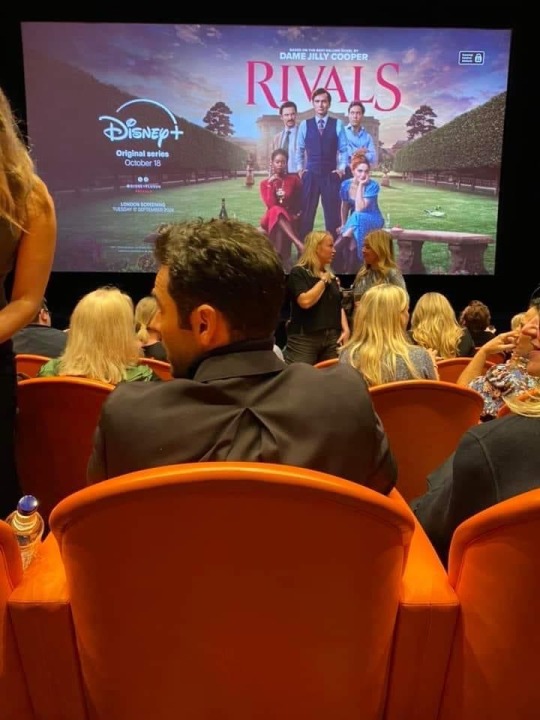
🤣🤣🤣👍
Kath and I tried not to squeal with excitement when Aidan Turner sat right in front of us (WHAT a handsome man). But sadly he was moved to the front, ready for the Q&A at the end. My friend Amanda was messaging me, telling me to sniff him so she could know what he smelled like. I was four drinks deep by then and might just have had a go, but thank god the poor man was moved before I could work out how to do this. And I probably avoided an arrest for public harassment into the bargain. So sorry, I can’t tell you what Aidan Turner smells like, but he looks very clean. And did I say how handsome he is? New pic of Aidan at the special UK screening of « Rivals », last September 17th. (Sam Harrington-Lowe Journalist)
NEW 💯💯💯
Aidan was sitting in the screening room.
I guess probably next to Victoria Smurfit, on his left
Thanks to my friend Isademrio who found the picture this morning
Thanks to the Journalist Sam Harrington- Lowe who published the article in the Silver Magazine yesterday and took this photo of Aidan, she was sitting right behind him
THE ARTICLE
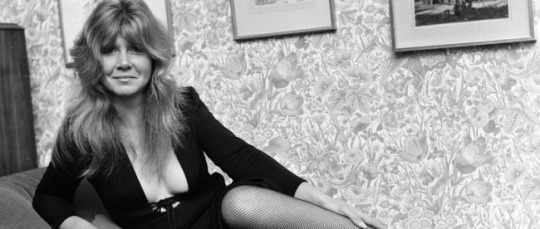
FIRST LOOK: JILLY COOPER’S RIVALS IS A WILD RIDE
The star-studded launch of Jilly Cooper’s Rivals
I’ve wanted to use this photo of Jilly Cooper for yonks, so I’ve dug it out shamelessly for this piece. Just look at her! How gorgeous? I suspect that Jilly’s life has probably been, in parts, as exciting and racy as many of her novels. When I think of Jilly Cooper’s Rivals, or Riders, or any of them, I sort of picture her like this, writing them.
I grew up loving Cooper. As a child, I can remember my dad guffawing to her columns in the heady days of Harold Evans’ Sunday Times, over a full English and untipped Gitanes. I was too young to read her then, but devoured collections of her scribblings a few years later. And as I hit my teens, I fell head over heels in love with her romantic heroines. Prudence, Octavia, Emily, Bella, Imogen et al – I read them cover to cover, repeatedly. I loved Octavia best, because who doesn’t love a broken bad girl? And Octavia was very naughty indeed.
Tame stuff by today’s standards really, despite the wildness of the ‘70s. But my love for Jilly was set for life. The delicious Britishness of it all was a big part of the attraction. I devoured the wicked filth of Jackie Collins, but it was so American to me, settings I could barely relate to. Whereas Cooper wrote very much about life from my own frame of reference. Country living, London, dogs, ponies… ridiculous 11am drinks parties. As a child, one of my first ever jobs was as a pheasant plucker – I kid you not. So to find someone writing about sex, drama, and intrigue in English country villages…
Read more: Are you common? A class guide…
But I digress
When the big ‘bonkbusters’ (god, I hate that term) started coming out, I was in fits of ecstasy. From Riders onwards I was hooked, reading voraciously and pining until another one came out. I have no idea how one even starts to write novels like that, holding all that information about so many characters together. I can barely remember why I went into the kitchen. But reading the books, sinking into that heady world of treachery, and money, and sex, and absolutely appalling behaviour was a wild pleasure I can still feel today.
So when I saw that Rivals was to be made into a TV series – by Disney no less, a weird marriage, I thought – I was wary. There have been a few adaptations of Cooper’s work before, and they’ve largely been rather awful. Would this be any different? As luck would have it, I was invited to a premiere screening of the first two episodes, followed by a panel sesh with some of the actors – so I would get to find out sooner rather than later.
The invite had specified there would be ’80s-themed drinks and canapes, and on the way up to town, my plus-one Kath and I necked G&Ts and wondered what they might be. Vol au vents, for sure. Possibly smoked salmon. Prawns? It turned out to be a take, rather than a religious revisit, which is probably better. But there were vol au vents, you’ll be pleased to know (creamy chicken and mushroom). Also prawn cocktails, and teenie Black Forest gateaux, amongst other delights.
…you could have been forgiven for thinking it really was 1985. We circulated a bit, rubbing shoulders with celebs and quaffing bubbles and tequila sunrises…
We did however arrive to a glittering event with Duran Duran blaring, hot and cold running cocktails and champagne, and stars galore. For one moment you could have been forgiven for thinking it really was 1985. We circulated a bit, rubbing shoulders with celebs and quaffing bubbles and tequila sunrises, before taking seats in the sumptuous screening room.
Kath and I tried not to squeal with excitement when Aidan Turner sat right in front of us (WHAT a handsome man). But sadly he was moved to the front, ready for the Q&A at the end. My friend Amanda was messaging me, telling me to sniff him so she could know what he smelled like. I was four drinks deep by then and might just have had a go, but thank god the poor man was moved before I could work out how to do this. And I probably avoided an arrest for public harassment into the bargain. So sorry, I can’t tell you what Aidan Turner smells like, but he looks very clean. And did I say how handsome he is?
Tell us about the show
I’m not allowed to write about the show itself yet properly. It’s embargoed until whatever date was on the piece of paper they made me sign. So I can’t actually review it properly. But I think I can tell you a few things without getting strung up.
The lineup was always going to make this enjoyable viewing, even it was shit, let’s face it. Some of my faves are in this – David Tennant, Katherine Parkinson, Danny Dyer, Aidan Turner, Emily Atack… and many more, as they say. It’s a great bunch, and dare I say it, very well cast. Tennant is sneering and chippy as Lord Tony Baddingham, Danny Dyer a perfect Freddie Jones. Bella Maclean is meltingly beautiful as Taggie, and Victoria Smurfit is a brilliant, fragile Maud O’Hara. And if you tell me that there’s a better actor to play hot-headed, principled Irish TV star Declan than Aidan Turner, well I don’t believe you.
The lineup was always going to make this enjoyable viewing, even it was shit, let’s face it
If you’ve been looking at the photos and thinking that Alex Hassell isn’t right for Rupert Campbell-Black, well, you’re not alone. Even Alex admits to being really worried about stepping into his shoes and not exactly looking like everyone expects him to. He’s not blond, for a start. But – and there are no real spoilers here Disney, if you’re reading this – after literally every part of Alex is revealed in the very first episode, as he points out, there’s nowhere really left to hide. So he just “got on with it.” And honestly, he makes a pretty good fist of it. He’s handsome, dastardly, and has a good bash at Rupert’s hidden depths, such as they are.
The challenge of taking on well-known characters
Many of the actors channelled older family members or situations. As readers of the book will know, Declan is fiercely protective of his family. Aidan said he was able to get into Declan mode by looking back at his own family. “He’s a dad, I’m a dad,” says Aidan. “I sort of related to him. And he’s like my dad, he’s Irish, there’s the hair…”
Nafessa Williams, who plays the gloriously feisty TV exec Cameron Cook, said she couldn’t wait to immerse herself in the ’80s, pointing out that she had family back then who looked exactly like she did in the show, big hair and all. She’d been able to use her own experience as the only American actor in the show, not really having insight into the wonders of the English countryside.
“It’s a lot like life imitating art, right?” she says. “Like, she [Cameron] came from New York to come here, I came from LA. So I understood her coming here and being new and not understanding this world.”
I’m not sure how many slow-burn relationships are allowed to happen in a world of Tinder and so on, so it was extremely enjoyable to play
Katherine Parker plays gentle Lizzie Vereker, and I suspect talking about the situation between her character and that of Danny Dyer’s is off limits, although obviously you can read what happens in the book. But she confesses to being thrilled to be working with him, and their chemistry is lovely.
“I was so pleased that Danny was playing that part. It’s so beautifully drawn throughout the series, their dynamic. And it unfolds over eight episodes, which is a kind of slow-burn relationship. Which feels very ‘80s. I’m not sure how many slow-burn relationships are allowed to happen in a world of Tinder and so on, so it was extremely enjoyable to play.”
And another great team
David Tennant is Lord Baddingham, massively hung up on class and wanting to fit in. He’s anchored by his wife, Lady Monica, played by the excellent Claire Rushbrook, who is very much old school posh, and who gives him the only real class clout he has. David says he loved playing Tony.
“It’s all there, it’s all there in the writing. And it’s very potent, it’s very British. But it’s very human too, you know? Like, [as Tony] I can never quite be where I want to be, to always be disappointed, because no matter how hard you try, there’s a club you’re not allowed to be in. And for someone like Tony, that’s devastating. He can only try harder. And he will never be satisfied because he’s always one peg down from the exclusive club, and it kills him.”
…he will never be satisfied because he’s always one peg down from the exclusive club, and it kills him…
Tony’s a grammar school boy, as opposed to, say, Rupert’s start in life at Harrow. And the chip on his shoulder is enormous. The most important thing to Tony?
“Winning!!” shouts Tennant, quite literally, channelling Tony alarmingly right there in the screening room. “Whatever that means, and whatever the situation… because he can never have the ultimate prize, he must have ALL the other prizes.” Tennant laughs. “He’s very balanced. There’s no daddy issues here, AT ALL!”
On scenes with Claire Rushbrook as his wife, Lady Baddingham. “I love those scenes, because it’s where all his armour falls away, and you get to see the little boy again. And he’s sort of got his mum there, that comfort. He’s very at home with her, and absolutely needs her. And he kind of runs this extraordinary lifestyle of treachery and debauchery, but he always has to have Monica.”
It’s not often I fangirl massively, but honestly. It’s DAME JILLY COOPER! After a lifetime of reading her books and words, I actually found it quite emotional to see her in the flesh. She was utterly divine, just so happy with the production and telling all the girls how beautiful they were and all the men how handsome. Plus ca change, Jilly! She’s a rather marvellous 87 now, and looking good on it. Plenty of the old Cooper sparkle, and clearly having a whale of a time at the do. I didn’t get to corner her, and probably would have been too shy really. But it was enough to have been there for this whole event.
As for the show – well, I could have sat there and binged the whole lot in one go. Which is, I suspect, what will happen when it finally airs. It’s one hundred per cent a ‘romp’ and not to be taken massively seriously. I absolutely loved it, and really hope they make the entire Rutshire Chronicles into telly shows, if they’re going to be like this.
Jilly Cooper’s Rivals launches on 18 October on Disney+ in the UK
Don’t say: “I’ll have a soya matcha latte with a gluten-free protein bar.”
Do say: “More champagne and keep it coming, and pass the Dunhills.
20 notes
·
View notes
Text
Have you played SPACE 1889 ?
By Frank Chadwick

Everything Jules Verne could have written. Everything H. G. Wells should have written. Everything Arthur Conan Doyle thought of, but never published – because it was too fantastic.
In the year 1870, American inventor Thomas Edison paved the way to the stars!
“He reached Mars with the prototype of an ether flyer and was the first man to set foot on the red sand of a foreign world. He was the first of many to come who would gaze in astonishment at the wonders of Mars and its inhabitants—the canals of the Red Planet, built many millennia ago; cities that were already old when on Earth, the Sumerians stacked clay bricks to build the first settlements; and relics of old technologies the functionality of which has long been forgotten. Numerous other explorers have followed in Edison’s footsteps, not only reaching the Red Planet, but pushing forward to the other planets.”
Space: 1889 brings to life the literary fantasies created by Jules Verne, H. G. Wells, Arthur Conan Doyle, H. R. Haggard, and many others. Space: 1889 is a science fiction roleplaying game in a more civilised time. A time when gentlemen and ladies of good character discover that there are adventures to be found in London’s fogbound alleys just as much as there are on the dusty streets of Syrtis Major on Mars. A time when soldiers might be posted to East Africa or Mars by order of their country; a time when inventors rush to test their latest designs and their latest theories; a time when historians search for the secrets of the ancient Martians; and when wild Venusian Lizard-men and proud Martian steppe warriors must serve their tribes and seek fame and fortune in a time when aliens from Earth have come to their planets.
21 notes
·
View notes
Text
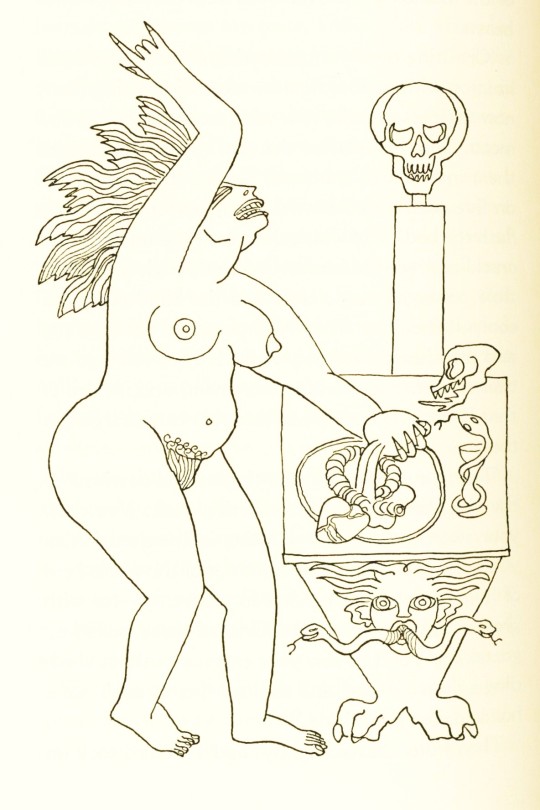

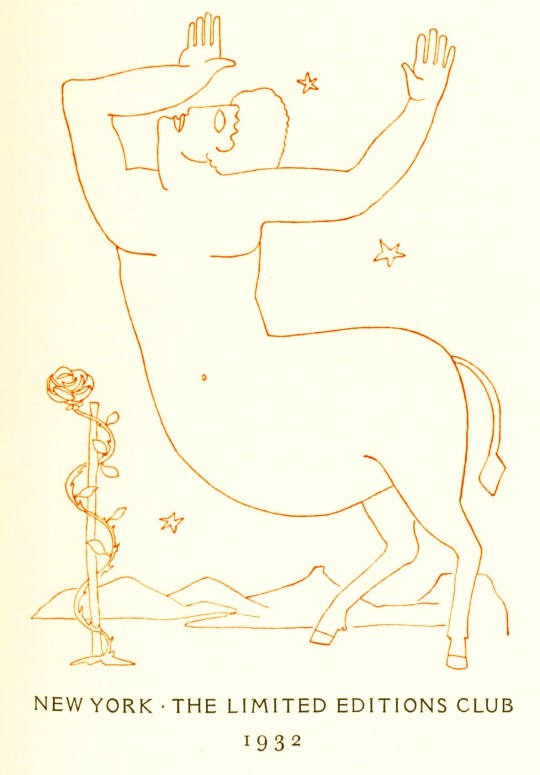
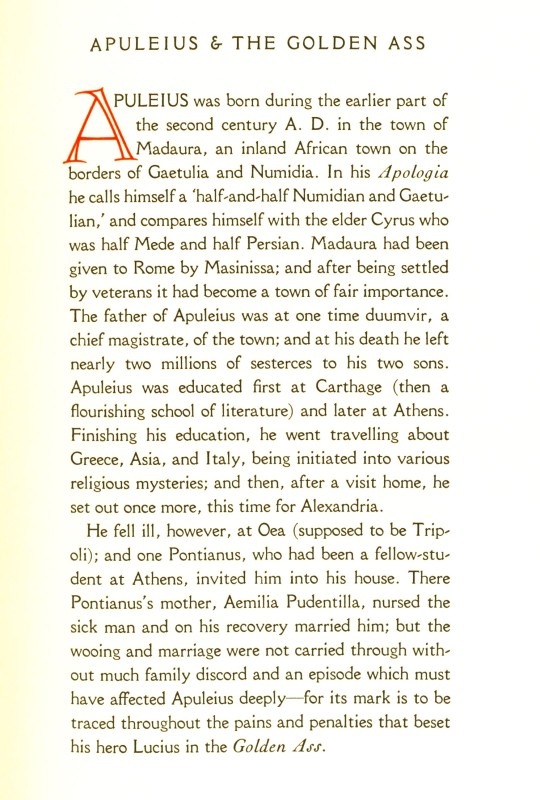
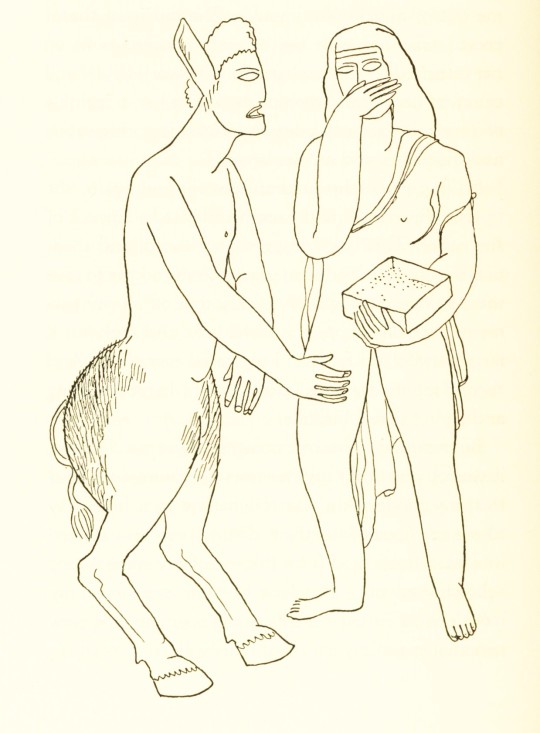
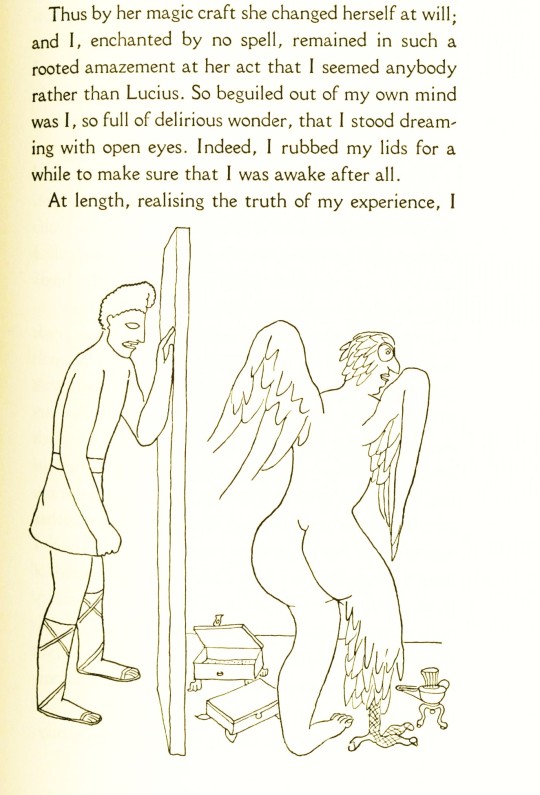
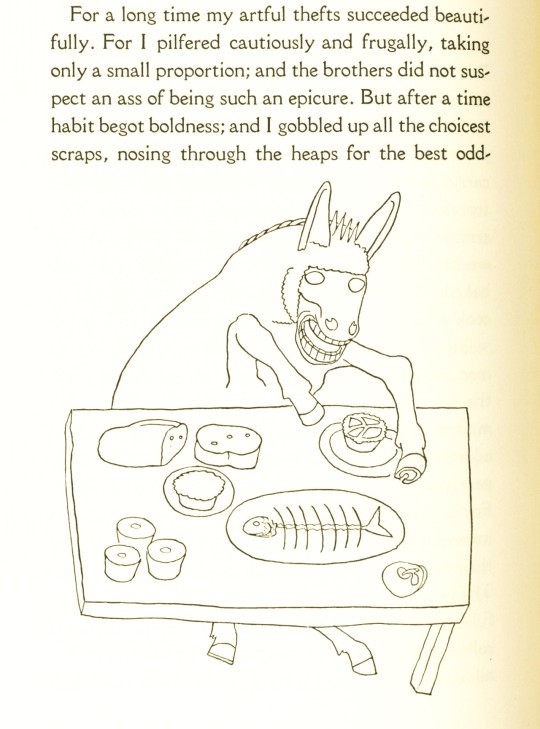

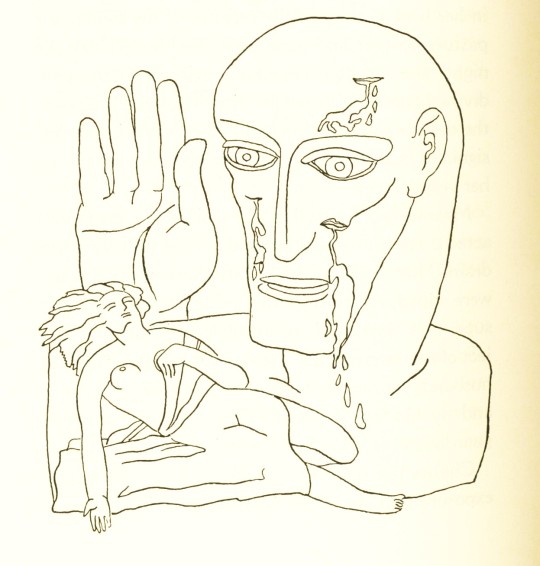

It's Fine Press Friday!
This 1932 Limited Editions Club (LEC) publication of the ancient Roman novel The Golden Ass, (also known as the Metamorphoses of Apuleius), was one of the many artist-illustrated classics produced under the direction of American publisher and LEC founder George Macy (1900–1956). It tells the extraordinary and oft unsavory tale of Lucius, a young man experimenting with ancient religious magic who accidentally transforms himself into a donkey instead of a bird- a condition he is able to reverse only after a wild journey of misadventure which concludes with his induction into the cult of Isis.
The novel, originally composed in Latin in the 2nd century by philosopher and scholar Lucius Apuleius (c. 124 CE-c. 170 CE), was translated into English for this edition by writer and social activist Jack Lindsay (1900-1990) and features reproductions of pen and ink illustrations from Percival Goodman (1904-1989), a progressive urban theorist and architect more widely known for his postmodernist architectural renderings and contributions to modern synagogue design.
The book was printed in a limited edition of 1500 copies by John S. Fass (1890-1973) at the Harbor Press in New York, a fine-press printing house founded by Fass and Roland & Elizabeth Wood in 1925, and features type designer Thomas Maitland Cleland’s (1880-1964) elegant Della Robbia typeface in black and red ink on Worthy special paper, illustrated endpapers, and gilding on the top edge of the text block. Goodman’s signature is inscribed in red ink beneath the colophon. The publisher’s announcement included with our copy describes the edition as bound in “full natural ass’s hide”, a characterization critically described by Claire Badaracco in her 1995 book Trading Words: Poetry, Typography, and Illustrated Books in the Modern Literary Economy as “stretching the boundaries of good taste”, but we think that the smooth, gold-stamped cover is quite lovely and understated in person!
View more Limited Edition Club posts.
View more Fine Press Friday posts.
-- Ana, Special Collections Graduate Fieldworker
#Fine Press Friday#fine press fridays#Apuleius#The Golden Ass#Limited Editions Club#LEC#Percival Goodman#Jack Lindsay#John S. Fass#Harbor Press#Thomas Maitland Cleland#Della Robbia type#Worthy Paper#fine press books#fine press publishing#Ana
56 notes
·
View notes
Text
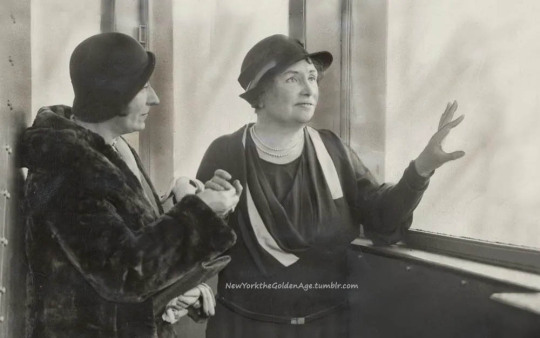
Seeing in The New York Times the photograph of Helen Keller in the Observation Tower of the Empire State Building, I [Dr. John H. Finley] wrote her asking her what she really “saw” from that height. This remarkable letter written by her came in answer and was published in The New York Times Magazine. It will be agreed by all who read it that, as she said, she “beheld a brighter prospect than my friends with two good eyes.”
January 13, 1932 Dear Dr. Finley:
After many days and many tribulations which are inseparable from existence here below, I sit down to the pleasure of writing to you and answering your delightful question, “What Did You Think ‘of the Sight’ When You Were on the Top of the Empire Building?”
Frankly, I was so entranced “seeing” that I did not think about the sight. If there was a subconscious thought of it, it was in the nature of gratitude to God for having given the blind seeing minds. As I now recall the view I had from the Empire Tower, I am convinced that, until we have looked into darkness, we cannot know what a divine thing vision is.
Perhaps I beheld a brighter prospect than my companions with two good eyes. Anyway, a blind friend gave me the best description I had of the Empire Building until I saw it myself.
Do I hear you reply, “I suppose to you it is a reasonable thesis that the universe is all a dream, and that the blind only are awake?” Y—es—no doubt I shall be left at the Last Day on the other bank defending the incredible prodigies of the unseen world, and, more incredible still, the strange grass and skies the blind behold are greener grass and bluer skies than ordinary eyes see. I will concede that my guides saw a thousand things that escaped me from the top of the Empire Building, but I am not envious. For imagination creates distances and horizons that reach to the end of the world. It is as easy for the mind to think in stars as in cobble-stones. Sightless Milton dreamed visions no one else could see. Radiant with an inward light, he sent forth rays by which mankind beholds the realms of Paradise.
But what of the Empire Building? It was a thrilling experience to be whizzed in a “lift” a quarter of a mile heavenward, and to see New York spread out like a marvellous tapestry beneath us. There was the Hudson—more like the flash of a sword-blade than a noble river. The little island of Manhattan, set like a jewel in its nest of rainbow waters, stared up into my face, and the solar system circled about my head! Why, I thought, the sun and the stars are suburbs of New York, and I never knew it! I had a sort of wild desire to invest in a bit of real estate on one of the planets. All sense of depression and hard times vanished, I felt like being frivolous with the stars. But that was only for a moment. I am too static to feel quite natural in a Star View cottage on the Milky Way, which must be something of a merry-go-round even on quiet days.

I was pleasantly surprised to find the Empire Building so poetical. From everyone except my blind friend I had received an impression of sordid materialism—the piling up of one steel honeycomb upon another with no real purpose but to satisfy the American craving for the superlative in everything. A Frenchman has said, in his exalted moments the American fancies himself a demigod, nay, a god; for only gods never tire of the prodigious. The highest, the largest, the most costly is the breath of his vanity.
Well, I see in the Empire Building something else—passionate skill, arduous and fearless idealism. The tallest building is a victory of imagination. Instead of crouching close to earth like a beast, the spirit of man soars to higher regions, and from this new point of vantage he looks upon the impossible with fortified courage and dreams yet more magnificent enterprises.
What did I “see and hear” from the Empire Tower? As I stood there ’twixt earth and sky, I saw a romantic structure wrought by human brains and hands that is to the burning eye of the sun a rival luminary. I saw it stand erect and serene in the midst of storm and the tumult of elemental commotion. I heard the hammer of Thor ring when the shaft began to rise upward. I saw the unconquerable steel, the flash of testing flames, the sword-like rivets. I heard the steam drills in pandemonium. I saw countless skilled workers welding together that mighty symmetry. I looked upon the marvel of frail, yet indomitable hands that lifted the tower to its dominating height.
Let cynics and supersensitive souls say what they will about American materialism and machine civilization. Beneath the surface are poetry, mysticism and inspiration that the Empire Building somehow symbolizes. In that giant shaft I see a groping toward beauty and spiritual vision. I am one of those who see and yet believe.
I hope I have not wearied you with my “screed” about sight and seeing. The length of this letter is a sign of long, long thoughts that bring me happiness.
I am, with every good wish for the New Year,
Sincerely yours, Helen Keller
Top photo: Times Wide World Photos/Letters of Note Bottom photo: Associated Press
#vintage New York#1930s#Helen Keller#Empire State Building#Empire State Bldg.#Jan. 13#13 Jan.#blind#deaf#imagination#seeing blind#how blind see#idealism#materialism#American materialism
48 notes
·
View notes
Text
youtube
Happy Birthday James “Midge” Ure born October 10th 1953 in Cambuslang.
Born to a working class family Ure attended Cambuslang Primary School and Rutherglen Academy in Glasgow until he was 15 years old. For the first 10 years of his life he lived in a one-bedroom tenement flat. After leaving school Ure attended Motherwell Technical College and then began to work as an engineer, training at the National Engineering Laboratory (NEL), in nearby East Kilbride.
Midge started playing music in a Glasgow band called Stumble in 1969, before joining Salvation, a Glasgow-based group that became the bubblegum band Slik in 1974. Upset in the change of direction, Ure left the band to join the Rich Kids, a punk-pop group led by former Sex Pistol bassist Glen Matlock. The Rich Kids only released one album, 1978’s Ghosts of Princes in Towers, before breaking up later that year. Ure spent a brief time with the Misfits (not the American band) before forming Visage with drummer Rusty Egan and vocalist Steve Strange; he left the group to replace Gary Moore in Thin Lizzy, who had left in the middle of an American tour. After the tour was finished, Ure fulfilled an agreement to join Ultravox as the replacement for John Foxx.
Once he joined the band in 1980, Ure helped make Ultravox a mainstream success; during this time he also worked as a producer, making records with Steve Harley and Modern Man. In 1982, Ure released a solo single, a cover of the Walker Brothers’ hit “No Regrets”; it climbed into the U.K. Top Ten. Ure and Bob Geldof formed Band Aid, a special project to aid famine relief efforts in Ethiopia, in 1984. The two wrote the song “Do They Know It’s Christmas?” and assembled an all-star band of musicians to record the single; it sold millions of copies over the 1984 holiday season.
In 1985, Ultravox was put on hiatus and Ure began to pursue a full-time solo career. Recorded entirely by Ure, his 1985 solo debut, The Gift, launched the number one single “If I Was,” as well as the minor hits “That Certain Smile” and “Call of the Wild.” The following year, he recorded the final Ultravox album; in 1987, the band broke up and he began recording his second solo album. The resulting record, 1988’s Answers to Nothing, was less successful than The Gift in the U.K., yet it charted in the U.S., which is something Ure’s previous album failed to do. Three years later, Ure released his third album, Pure; while it didn’t do any business in America, the album featured the Top 20 British hit “Cold, Cold Heart.” He attempted a comeback in 1996 with Breathe, which went ignored by both the American and British markets. Four years later, his score for the Jon Cryer drama-comedy Went to Coney Island was issued by the Evenmore label.
Ure’s recording activity during the 2000s began with Move Me, which featured some surprisingly hard rocking material. A few years later, he published an autobiography, If I Was, and then, with Geldof, arranged the Live 8 concerts.
Following the release of the covers-oriented 10 IN 2008, Ure participated in an Ultravox reunion and continued to record as a solo artist. Fragile was issued in 2014, and featured the Moby collaboration “Dark, Dark Night.” In 2017, he collaborated with composer Ty Unwin on the album Orchestrated, which featured orchestral reworkings of Ultravox songs, as well as songs from his solo career.
In 2020 Midge released an album Soundtrack 1978-2019, he was one of the lucky artists to have completed his tour promoting this in February that year.
Midge has recently revealed why he turned down an offer to join the Sex Pistols, telling The Telegraph that he considered that taking up the invitation from the band's manager Malcolm McLaren would have been like "joining a slightly edgier Bay City Rollers". He received the offer to join the fledgling punk band back in 1975, while on a visit to McCormack’s instrument hire shop in Glasgow.
In an interview published in the Telegraph he said;
"I was stopped in the street by the Clash’s manager, Bernie Rhodes, who then introduced me to Malcolm McLaren, I didn’t know who either of them was, but they literally asked me to join the Sex Pistols without even asking what I did. To me it would have been like joining a slightly edgier Bay City Rollers, so I turned them down.
Last October Midge celebrated seven decades of music with a concert at the Royal Albert Hall.
Concerts coming up for Midge are, 24th October: Tvonica Culture - Zagreb , 31st October: Stadfeestzaal - Aarschot, Belgium with Lena
Lovich, before 27 dates in Scotland, England, Ireland and Wales ending in December, he then travels to United Arab Emirates for a gig in February, March sees the hard working Scot play 11 nights in Sweden and Germany.
Midge Ure is one of Scotland’s all-time most successful musicians. He is married with four daughters and lives in Somerset.
The video is Midge, with Pilot,s David Paton from a Live Hogmanay show in 1995.
15 notes
·
View notes
Text
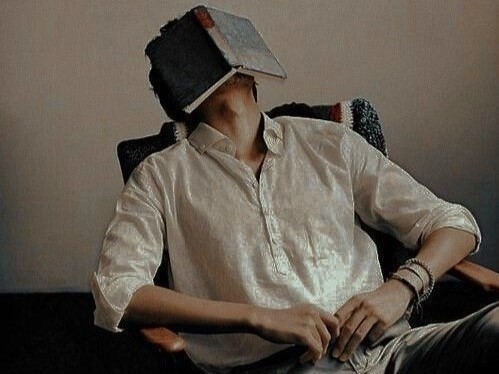
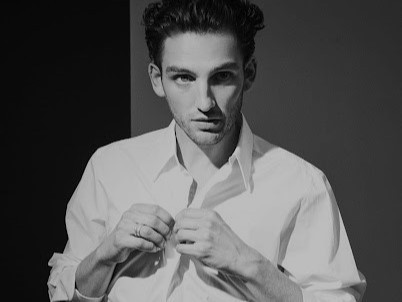
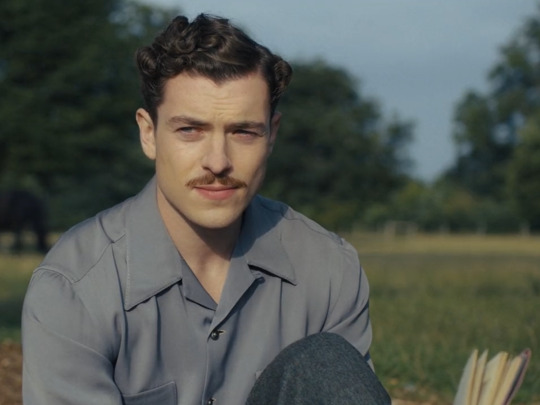
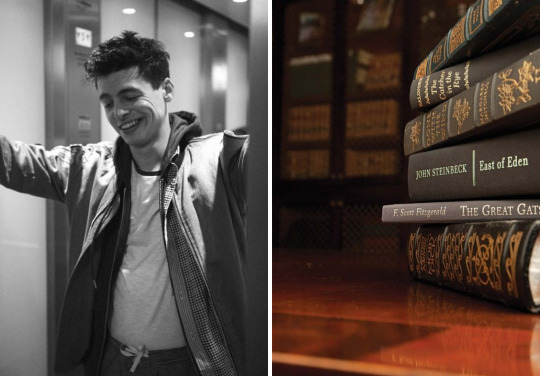
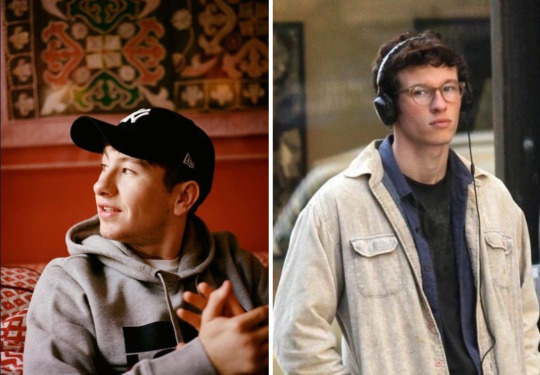
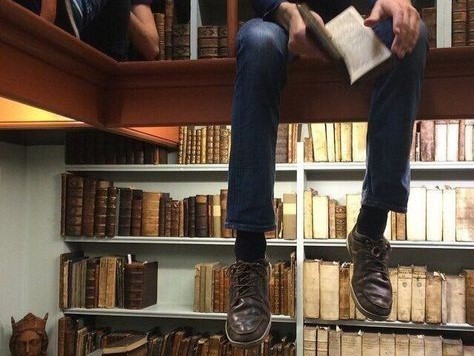
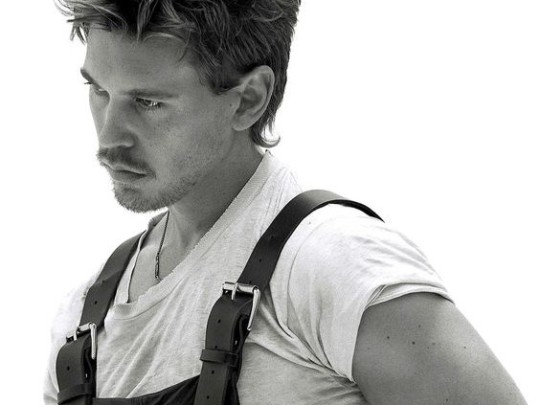
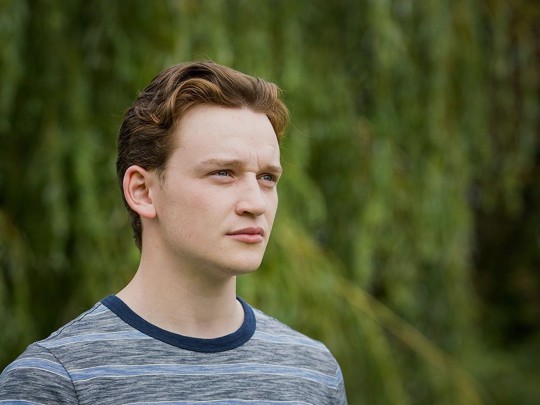
seven degrees east - chapter one
Fandom: Masters of the Air Pairings: Gale x Bucky; Nash x Helen; more tbd Rating: T (may change) Chapter: 1 / ? Word Count: 3798
Summary: It's 1996. Soundgarden's on the radio, Charles and Diana are headed for divorce, and seven American PhD candidates are studying literature at the University of Thorpe Abbotts in Norfolk, England. Between taking Prof. Harding's summer class and obsessing over their favourite authors, the boys will kick asses when they must, and fall in love if they can.
Spring was about to fall headlong into summer and Bubbles had decided Princess Di was the woman for him. They were all in love with her. Tabloid magazine photos of Diana in black and lavender—torn with care along the crease—decorated the walls of their dorms, overlapping posters for Superunknown and Crimson Tide, pieces they’d had published in the literary journal, and mundane scraps of paper elevated by their status as vessels for the phone numbers of girls they’d met at parties. Naturally, their Princess took supremacy, especially as they expected imminent, official news of her divorce from Charles. Lucky Bubbles.
It was mid-June 1996. They spent their days horny and sunburnt from laying out on the school’s big English lawn. These long stretches of apparent leisure were punctuated by the summer course in which they were all enrolled: “Thoreau’s Walden,” taught by Professor Harding. He was transparently attempting to instill in them a sense of self-reliance alongside an understanding of transcendentalist thought. The class wasn’t mandatory—the rest of their cohort would rejoin them in September—but their small group comprised a brotherhood of dedicated scholars. (Dedicated to having fewer courses to take come fall semester.)
Bubbles was their Great American Novel man, obsessed with Faulkner’s long sentences and Steinbeck’s long books. Crosby envied and lionized his best friend’s focus, but had come to accept that he was irresistibly drawn to the lower-brow, femme-fatale charm of Chandler and Hammett’s hard-boiled novels. Robert “Rosie” Rosenthal was their resident 19th-centuryist, plotting the spread of both his dissertation and his mustache on the fertile—if possibly cursed—intellectual ground of Edgar Allan Poe. Herbert Nash was Rosie’s chronological compatriot. Though he’d begun the doctoral program with a proposed focus on the works of Mark Twain, he had a literary wandering eye for anything that struck him as romantic. In the face of Nash’s flakiness, Curt fought (sometimes physically) for the pure pleasure of reading, but then he was often under the hedonistic, lunar-like sway of Oscar Wilde—a deviation (guided, he claimed, by his Irish heritage) from the later, hedonistic influence of his preferred poison: the Beat Generation.
If their ragtag band of chronic dogear-ers had a leader, it should’ve been Jack Kidd. Kidd was an upper year student, nearly finished with his PhD (unless his PhD finished with him first). He was secretive, perpetually put-upon, and capable of delivering heart-shattering criticism in a tone that made it sound like mercy. In short, he was everything they longed to be. When asked about the subject of his dissertation, he would drop his face into his hands with all the enthusiasm and surrender to gravity of a bridge suicide. In lieu of possessing the middle-aged-divorcé jadedness that seemed to come naturally to Kidd despite his being only 29, the seven younger candidates had taken up smoking the preceding November.
Because they did need a leader to make sure they did things like readings and laundry and correcting their posture after hours spent curled over, under, and around the library’s long oak tables, they had Bucky. And they had Buck, because it was smart to have a backup. “Bucky” was really John, and “Buck” was Gale, and when any of the other five called them out on being pretentious fucks, they would both grin and offer no correction. While John directed his furrowed brow at Lost Generation titans like Hemingway, Stein, and Fitzgerald, Gale was dreamily engrossed in a fin-de-siècle love affair with Henry James. At any given time, at least three of them (including John) were waiting for the pair to realize that who they were actually head over heels for was each other.
They were all students at Thorpe Abbotts—the Norfolk satellite campus of the Connecticut university. They knew people studying Goethe and Voltaire, Tolstoy and Shakespeare and García Márquez, seriously, they did. They just happened to be a collection of Americans reading Americans. In England. For one reason and another, they’d decided to study overseas, intrigued by the allure of matched tuition fees, rainy reading weather, and the proximity to older and fancier universities, which were fun to visit if they were looking to instigate a winnable fight against other easily-provoked academics.
That particular evening, they descended upon a bar favoured by students from the University of East Anglia. John and Rosie had both offered to drive. To decide who’d had to go with John (concealed as who’d wanted to go with John), Crosby had flipped a coin—well, a double-sided Batman pog he’d produced with minor embarrassment after fishing around in his pocket for a coin. As a result, Gale and Curt tumbled from John’s Wrangler (Gale from the passenger’s seat, Curt from the bench in the rear) looking half-drunk already from John’s weaving, lead-footed panache behind the wheel. Rosie pulled up smoothly, with no complaints from Bubbles, who might not have complained even if they’d slid into the parking lot on their roof, Crosby, whose motion sickness had not been triggered, or Nash, who’d ironed a shirt for this outing in hopes of meeting a nice girl. The rest had openly teased him, then tried not to feel self-conscious about their own attire.
“You look like Hugh Grant,” John leveled at Nash when he saw him sweeping his hair back as they made for the bar.
“Thanks.”
“Wasn’t a compliment.”
Fortunately for Nash, he was impervious to most insults. John knew this and took it as licence to tease him all the more.
“Ladies love Hugh Grant,” Nash reasoned.
“Don’t say ladies,” Curt whined. “Fuck’s wrong with you?”
“The thing Hugh Grant has going for him is he’s British,” John explained.
“And he’s a movie star,” Gale offered, nonpartisan.
“Stellar addition, Buck: and he’s a movie star.” He turned back to Nash. “You’re non-movie-star, American Hugh Grant. Capisce?”
“Don’t say capisce.” Curt took out his frustration on the loose chunk of asphalt he booted across the parking lot.
“Ah, don’t listen to him, Nash,” Rosie instructed, slinging an arm around Nash’s neck and hauling him close so his steps stuttered and skipped.
“You look good, Nash,” Gale said.
“Like a real gentleman.”
“Too bad he’s just Nash disguised as a gentleman,” John lamented with a grin.
Nash cracked a telling smile.
“Whaddaya think, Croz?” John demanded. He looked around and found Crosby and Bubbles trailing them, laughing about something that was part of their own conversation. “Croz! Nash in disguise! This some kinda hard-boiled, sleazy villain shit?”
Crosby shrugged.
“Nash is Nash.”
“Nash is Nash,” Bubbles agreed, and then they were all saying it, speaking over one another, until their voices dropped into sync and it turned into a chant as they shoved into the warmth of the bar.
They fell into a booth together, then forced Crosby and Bubbles back out to get the first round since neither of them had driven and even if you tried to send one without the other, they’d both go anyway, as though attached by a tether. They returned with pitchers.
“Croz got carded,” Bubbles gleefully announced, handing out glasses from the stack in his hand.
Everyone awwwed. Crosby erupted in a flaming blush.
“Don’t worry about it, Croz,” Gale told him. Crosby nodded gratefully, but then Gale tacked on, “When I was your age—”
Crosby’s protestation that they were the same age had Rosie laughing until he had tears in his eyes. He tilted sideways into Nash, who did his best to scoot away.
“I love you Rosie, but I will slash your fucking tires if you wrinkle my shirt.”
This just made Rosie laugh harder.
“You alright to drive back?” John checked with Gale, leaning in to speak quietly below the hilarity.
“I gotcha, man.”
John nudged Crosby out of the booth a second time and came back with a pitcher of water for Gale, who’d smoke weed and cigarettes with the rest of them but drew the line at carbonation. Crosby’s hand hesitated between the pitchers of beer and water.
“I’ll drive,” Rosie assured him, brushing away Crosby’s wordless offer with a wave of his hand.
Crosby looked relieved to be let off the hook. He poured himself a beer.
John pointed at Rosie.
“You’re too damn self-sacrificing.”
“Maybe you’re too sac-selfrificing,” Curt countered, making John twist to face him with an expression of extreme indignation.
“Oh yeah?”
“Yeah.”
“You wanna take this outside?” John squared his shoulders. Even though it was all in play, Gale held out his hand, palm down, suggesting they chill out a little. They’d been bounced from this bar before.
“Might as well stay put,” Curt said. “If I knock you on your ass while you’re already sittin’ down, you got less far to fall.”
John smacked the brim of Curt’s ballcap down over his eyes and they broke into a scuffle in the booth, legs scrabbling beneath the table, Curt giggling wildly as he jerked away from John’s hands while protesting that he couldn’t see. Crosby, sitting on Curt’s other side, attempted to right his hat, but ended up having to dodge Curt’s elbow instead.
“Bets?” Rosie asked.
“What’s on the table?” Bubbles wondered. Somebody’s knee slammed the actual table from underneath and Bubbles’ hand shot out to steady his glass. “Figuratively.”
“Losers have to format the winners’ essay citations.”
“That’s not ba—”
Crosby saw Gale whack the back of his hand into Bubbles’ chest to shut him up, but it was too late. Rosie was grinning.
“And type up their essay.”
They groaned. Bubbles, Nash, and Crosby shook their heads, bowing out, but Gale stuck out his hand for Rosie to shake.
“You’re on,” he said.
“Who’s your money on?” Rosie asked.
“Who d’you think?” Nash cut in.
It really was silly to ask; Gale took John’s side in everything, always. Crosby was going to point that out, begin recalling supporting evidence, but John started fighting really dirty—his hands dove to Curt’s sides, tickling hard, and Curt hopped back. Crosby bailed out of the booth and stood.
“Maybe they should take it outside,” Bubbles observed, reading Crosby’s concern on his face before he could voice it.
Just then, there was a scoff: “Typical.”
John ceased his attack on Curt as they turned to look with the others. Curt fixed his hat. There were three guys standing there, just past Crosby, who took a step towards the table to show his allegiance. Like most people they encountered off the Thorpe Abbotts campus, the trio were British. They looked about their age, maybe a little younger, and enough sheets to the wind not to mind that there were fewer of them than members of the group they’d accosted.
The pause after that single word seemed to go on and on. None of the seven had a doubt in their mind that it was a criticism of their behaviour—their Americanness. The Brits would expect them to get angry, to fly from their booth and jab their impolite American fingers in their faces, wet American spittle spraying from their mouths as they shouted rude American words. They didn’t know that this was what these particular Americans did for fun. That even now, in the pause, they were just deciding how they wanted this one to go.
“Can we help you?” Gale asked calmly, while his compatriots wordlessly downed their drinks.
“We’re just fine,” one of them replied. “Try helping yourselves.”
Gale glanced around at his friends as though confused.
“Did one of you need help with something?” he asked.
Curt had just poured himself a second beer. He held up a finger, signally for everyone to wait as he took a long swallow. He sighed in satisfaction.
“I actually do need help,” he said, looking not at Gale but at the Brits.
“Want us to teach you to tie your shoes?” a different one taunted.
“Nah,” Curt said, tone dangerously placid to the ears of his friends. “Nah, got that one figured out. I actually got a question for you: loserssaywhat?”
The first one frowned, head cocking slightly.
“What?”
Rosie guffawed, prompting the change in the trio’s expressions: superior to insulted. Angry. But Curt was beaming. He took another swallow of beer before slowly enunciating, “Losers. Say. What.”
And then he burped so loudly that Crosby, recounting the story to Kidd later that night, would swear it shook the walls.
“That wasn’t part of the question,” Curt clarified.
The strangers surged towards the booth and Crosby got in their way, Bubbles and Gale jumping up too to put a wall between them and Curt.
Gale said one word to them, and he said it like an order: “Outside.”
“Fucking right, outside,” was thrown back at him.
The three on their feet watched the Brits out the door, then turned back to the group.
“Who’s holding down the fort?” John asked.
“Not me,” Curt said. He clambered from the booth and started shadow boxing. As he ducked and wove, eyes fixed on an invisible opponent, John spun his hat around, brim at the back.
“Let’s all go,” Nash said from his spot against the wall. “Nobody’s gonna…”
He trailed off as his gaze landed on something beyond their prizefighting trickster, beyond the inseparable Bubbles and Crosby, beyond the deep-running still waters of Gale. There was a girl. A beautiful girl. Thick, dark hair, talking with another girl Nash barely noticed. As he watched, she laughed. She was even more beautiful when she laughed.
“Actually, I’ll stay,” he amended distractedly. He tilted his head to see around Curt as Curt decided to add footwork to his routine. “The rest of you can fuck off.”
Rosie looked where Nash was looking and smirked.
“Ah, no way, buddy. Wouldn’t leave you here all alone!”
“No more than three of us can go,” John declared. “It’s not…”
“Sportsmanlike,” Gale supplied.
John snapped his fingers and agreed, “Sportsmanlike.”
“I guess it’s you three then,” Bubbles deduced glumly, glancing between John, Gale, and Curt.
“Sure is,” John said, considerably more gleeful. He rose and clapped Bubbles on the shoulder. “Hang tight.”
“But—”
“If you go, Croz’ll come too, and we can’t go five-against-three; they’ll think we’re chickenshits.”
“Who cares about their opinion?” Crosby wanted to know.
“Me,” Curt said. He stuck out his lower lip in a pout. “They hurt my feelings.”
Crosby rolled his eyes.
“Get the fuck outta here.”
“Yeah, and do us proud!” Rosie shouted at their backs as Gale, Curt, and John trekked towards the exit. John pumped his fist into the air.
When they’d gone, Rosie smiled slyly at Nash.
“So. Are we calling her over here?”
“What?”
“YO!” Rosie yelped at the top of his lungs.
The girl, her friend, and a dozen other people in the crowded bar turned their heads, searching for the source of the sound.
“What the hell?!” Nash blurted.
Rosie frowned at him.
“You think she’s pretty, right?”
“Duh. Look at her—”
“MY FRIEND THINKS YOU’RE PRETTY! YEAH, YOU! BLUE SHIRT!”
“If I wanted her to think I was a total jackass—” Nash began.
“You’ll get your chance. I just got you started. Wave her over.”
“You ever think there’s a reason you don’t have a girlfriend?”
Nash slid along the seat until he was free of them all, though Crosby did offer an encouraging thumbs-up.
“Watch and learn,” he called over his shoulder. He locked eyes with the girl—the beautiful girl, who was miraculously staring back at him with an expression of amusement rather than scorn—as he headed her way.
—
Outside, the tension was thickening. The Brits should’ve gotten some kind of points for holding their ground, John thought, because they looked nervous now that he, Gale, and Curt were all on their feet, not folded up in that booth. He lifted his chin and squared his shoulders to make himself as big as possible. And he smiled, not as massive as Curt though. That seemed to be pissing them off, maybe making them stay: that Curt was full-on grinning.
“Thorpe Abbott?” the mouthiest of the three asked, like an accusation.
“Abbotts, numb nuts,” Curt corrected.
“What do they grade you with there? Scratch-and-sniff stickers?”
“I wish!” John said. There was a threatening gleam in his eyes.
“You know it doesn’t mean anything when they give you all hundreds right? Your degrees don’t mean shit.”
“It actually does mean something,” Curt said. He suddenly sounded so serious that his friends looked at him from the corner of their eyes. “We go in this special room, ’k? Maybe not so fancy as the rooms at wherever you boys go—”
“East Anglia,” was offered.
Curt nodded.
“Yep, Easy Anglia, whatever. But we go in this room and then—true story—this woman shows up. Like, our dean calls her up to let her know another one of us special boys—”
“Us special American boys,” Gale emphasized.
“—got himself another fuckin’ hundred. Takes her maybe half an hour to show up. And then, guess what, you guys?” Curt looked at the befuddled Brits eagerly. “She blows us.”
Their reaction was a blend of highly skeptical and stunned by the turn Curt’s story had taken. Shit’s sake, Curt, John was thinking. This is gonna be a hell of a fight.
“And, you know, she did mention she had a son,” Curt said measuredly, homing in on the mouthy guy now, “but, damn, you’re her spittin’ fuckin’ image.”
The Brits lunged at them.
—
Nash wanted to ask her to dance, to hold her by the hips and sway along to whatever rhythm she chose. He didn’t care if it didn’t match the beat of the music. He didn’t care that no one else was dancing, or that this wasn’t really a place where people did that. “Helen,” she’d said her name was.
“You read much?” he asked stupidly, but he wanted her to like him more than he’d ever wanted anything in his life. More than anyone in the history of humankind had ever even dreamed their descendants could want. The only thing he could think to talk about was books. Talking about books, he could start to sound smart again, reassemble his brain in the background while most of him got lost in Helen’s eyes.
“Yes.”
Nash loved how she said yes. His heart, thumping happily in his chest loved it. The rush of blood to his groin loved it. The sound of “yes” in her mouth. She was American. He tried not to think how easy it would be, the two of them moving back home after school. Or staying here, a pair of expats. Whatever she’d prefer.
“I’m actually studying creative writing.”
“Where?” he asked, starry-eyed.
Her eyes darted to her friend before returning to his face. The reaction said he was being sort of stupid now, but then her expression shifted to something like guilt. She’d felt bad for thinking it. for writing him off so quickly.
“At the University of East Anglia.”
“Oh. So, like, right nearby.”
“Right nearby,” she confirmed. “Hence…” She glanced around. Hence this bar. Hence. Totally. Nash gave her a smile, weak with adoration.
“Why there?” he asked.
“Kazuo Ishiguro studied there. I admire his work.”
“I loved The Remains of the Day.”
Helen smiled at him. The clouds parted. Probably.
“Me too,” she said. “Are you in the arts as well?”
“English,” he told her. “Thorpe Abbotts. Working on my PhD.”
She was sufficiently engaged now that her friend moved off, giving them space.
“What’s your field?”
“American,” he admitted, and she got it, and she laughed. An American studying Americans in England. He shrugged, embracing her reaction.
“Who do you like?”
You. But she’d meant which authors.
“Twain,” Nash said, “and Hawthorne.”
Helen’s eyes lit up.
“Yes! My greatest influences are second-wave. You know, Betty Friedan, Gloria Steinem’s exposé on the Playboy Club, obviously…”
“Well, sure,” Nash said, just keeping up as she spoke in an impassioned rush.
“But I love the early feminists too. Hawthorne and Charlotte Perkins Gilman and Alcott.”
“Little Women!”
“It’s probably still my favourite novel of all time.”
For the first time, Nash took a careful, calculated pause, and he gave her a look. A Nash look. It was a look that usually communicated let’s get out of here, but this time, he wanted more. He’d worn the shirt.
“I’ve never met anybody who was as much of a Jo as you are,” he said, meaning it.
It was noisy, but he heard Helen’s pleased gasp. That she was actually an Amy was something Helen had not yet admitted to herself, and so Nash’s compliment hit its target with full effect. He watched as her lips parted—to thank him? to kiss him? to say some other unforeseen thing that would change his life even further? make him feel the earth move under his feet? did she like Carole King?—but there was a hard tug on his elbow.
Nash turned to find Bubbles standing there. He was the one person Nash wouldn’t snap at for interrupting, and the others knew that. He’d been sent.
“I am so sorry,” Bubbles said, addressing Helen. He was beginning to slur his S’s. “I gotta steal him back for a minute.”
“I swear my friends don’t speak for me,” Nash said as Bubbles physically dragged him away from the conversation. “I know it’s happened twice now, but they don’t!”
Was it worth it, to be removed from Helen’s side and brought back to the booth? Nash was surprised to feel that it almost was—almost—when his eyes landed on their smiling trio of champions. Gale had a cut on his cheek where a fist must’ve connected, or at least glanced off; John had the dark promise of a bruise below one eye; and Curt didn’t have a scratch on him. Nash laughed, shaking his head.
“What was he tryin’ to say though?” John was asking.
“Mumbling some shit about our hundreds,” Gale replied. “Our ‘bloody hundreds.’”
“Yeah,” Curt said. “But it was after I’d clocked him square in the mouth. That’s why he was lispin’. ‘Bloody hundredth,’ it sounded like.” He chuckled. “Bloody hundredth.”
“To the Bloody Hundredth,” Crosby proposed, raising his beer.
Rosie passed Nash his refilled glass, then lifted his own for the toast.
“Bloody Hundredth,” the rest of them intoned.
“And to Princess Diana,” Bubbles’ voice rang out when the rest of them had a glass to their lips. “Wherever she may be tonight.”
Crosby adopted an expression of deep solemnity, but Rosie ruined it by snorting into his water.
“Alright, men,” John addressed them. “Back into the booth. We got some fuckin’ drinking to do.”
“Spoken like a true Hemingway scholar,” Gale observed.
John gave him an affectionate smile.
“I try.”
#my writing#Masters of the Air#MotA#MotA fic#Joseph 'Bubbles' Payne#Harry Crosby#Robert 'Rosie' Rosenthal#Herbert Nash#Helen (MotA)#Curtis Biddick#Gale 'Buck' Cleven#John 'Bucky' Egan#Bucky x Buck#Gale x John
35 notes
·
View notes